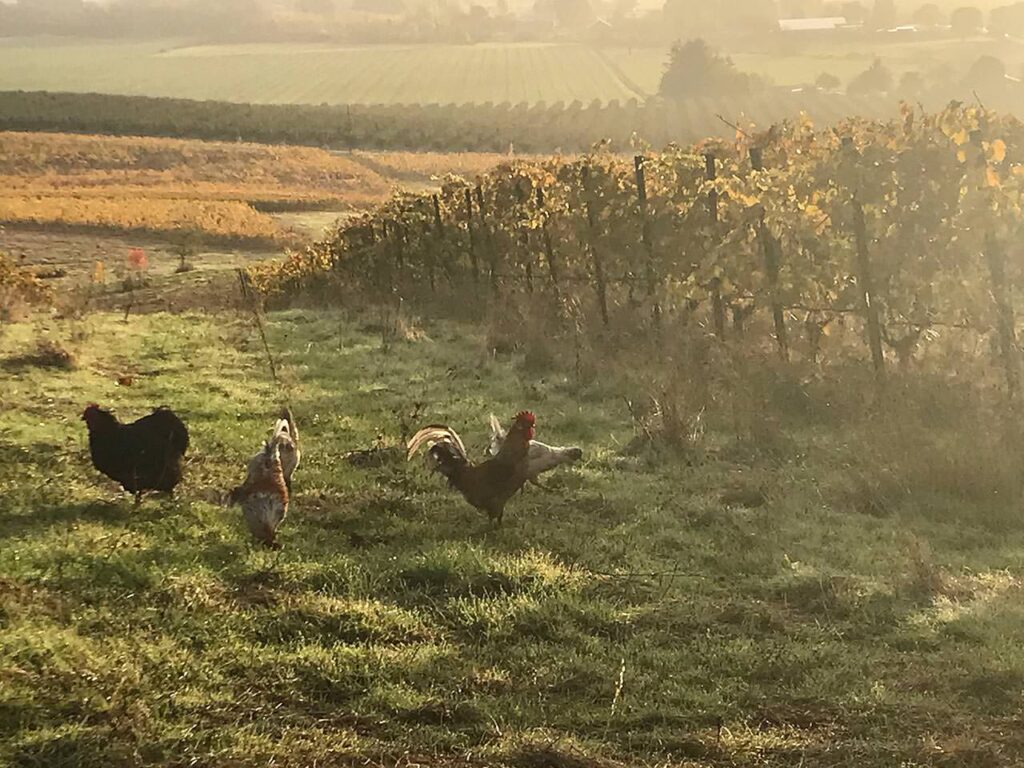


Our Story
In 2019, one of the Regenerative Viticulture Foundation’s founding trustees, Stephen Cronk, oversaw the purchase of a wine domaine in Southern France. The vineyard, despite being surrounded by protected natural parkland, had been intensively farmed for generations, and the soil quality had deteriorated to the point whereby it had been requiring increasing synthetic inputs for dwindling yields. Conversion to organic farming was instigated even prior to the purchase completing but more was needed to revitalise the soil and vines.
After discussions with leaders in regenerative agriculture and winegrowers, a switch to regenerative viticulture was targeted, and a search was performed for a dedicated non-profit organisation which would accompany the vineyard on its journey to regeneration. Although various organisations surrounding regenerative agriculture in general or promoting wine sustainability more widely were identified, there was a notable lack of an organisation dedicated specifically to regenerative viticulture. Combined with a growing public interest in the capability of regenerative agriculture to sequester atmospheric carbon, helping mitigate climate change and global warming impacts, as well as enhance the natural environment, this omission stood to be corrected.
Thus, in 2021, driven by a desire to understand and promote greater biodiversity in viticulture on a global scale, with the assembly of a board of renowned experts in the fields of winegrowing, regenerative agriculture, and communications, the Regenerative Viticulture Foundation was formed.
Through the work of the Regenerative Viticulture Foundation, everyone and anyone can learn about regenerative viticulture. Viticulturists, wine industry participants and the general public can access the research, education and resources readily provided by the Foundation, and those looking to make the change in the way they currently farm grapevines can be informed, encouraged and supported in their journey.



Our Mission
The environmental costs of agriculture have historically been too high – now the health of our planet is at stake. Cooperation is needed to research and understand farming solutions which go above and beyond mere preservation of the status quo, in order to regenerate soils and environments whilst maximising the opportunity to inhibit man-made climate change.
Our mission is to inspire the transition towards regenerative viticulture through science, communication and support for growers
Jesper Saxgren, Trustee of the Regenerative Viticulture Foundation
The Regenerative Viticulture Foundation is a non-profit organisation with the aim of understanding and promoting the benefits of greater biodiversity in viticulture. Our objectives are to:
- Bring together practitioners, researchers and leaders in regenerative agriculture and viticulture, working with experts in the fields of science, farming and communications.
- Scientifically prove and practically demonstrate or document the environmental, qualitative and economic benefits of biodiversity in viticulture.
- Inform and educate the educators at key wine institutions.
- Raise awareness of the ideas, importance and benefits of biodiversity in viticulture via seminars, workshops, social media events and talks.
- Create a support structure for people wanting to learn more about the ideas and benefits of regenerative viticulture including templates and guides for wine producers.
Our non-profit organisation provides, for the first time, a truly global Regenerative Viticulture network with Board representation from the USA, UK, France and Denmark.



Our Vision
Working with nature to create a sustainable future for vineyards, growers and the planet
Wine is by its nature a very social product, providing a unique opportunity to invite conversations about provenance, terroir and farming. Once people understand the positive impact wine farmers can have on climate and biodiversity they might start exploring a move away from ‘conventional’ farming and adopting a more holistic and regenerative approach to vineyard management.
Stephen Cronk, Trustee of the Regenerative Viticulture Foundation
Although vineyards represent a relatively small part of global agriculture, consumers of wine are closest to the producer through the emphasis on specific geographical location or terroir, together with locally specific cultural influences such as food matching. This public awareness of the importance of production methods in vineyards has the potential to expand to include other crops and industries, and the Regenerative Viticulture Foundation envisions a snowball effect contributing to a change in approach to farming worldwide, culminating in a healthier and happier planet.
The Regenerative Viticulture Foundation is squarely aligned with the UN Sustainable Development Goals, with goal #15 closely matching our vision:
Sustainable Development Goal #15: Protect, restore and promote sustainable use of terrestrial ecosystems, sustainably manage forests, combat desertification, and halt and reverse land degradation and halt biodiversity loss.